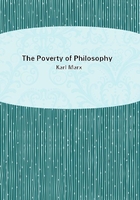
第19章 (1)
APPLICATION OF THE
LAW OF THE PROPORTIONALITY OF VALUE
A) Money "Gold and silver were the first commodities to have their value constituted."[I 69]
T hus, gold and silver are the first applications of "value constituted" ... by M. Proudhon. And as M. Proudhon constitutes the value of products determining it by th e comparative amount of labor embodied in them, the only thing he had to do was to prove that variations in the value of gold and silver are always explained by variations in the labor time taken to produce them. M. Proudhon has no intention of doing so. He speaks of gold and silver not as commodities, but as money.
His only logic, if logic it be, consists in juggling with the capacity of gold and silver to be used as money for the benefit of all the commodities which have the property of being evaluated by labor time.
Decidedly there is more naivete than malice in this jugglery.
A useful product, once it has been evaluated by the labor time needed to produce it, is always acceptable in exchange; witness, cries M. Proudhon, gold and silver, which exist in my desired conditions of "exchangeability"!
Gold and silver, then, are value which has reached a state of constitution:
they are the incorporation of M. Proudhon's idea. He could not have been happier in his choice of an example. Gold and silver, apart from their capacity of being commodities, evaluated like other commodities, in labor time, have also the capacity of being the universal agents of exchange, of being money. By now considering gold and silver as an application of "value constituted" by labor time, nothing is easier than to prove that all commodities whose value is constituted by labor time will always be exchangeable, will be money.
A very simple question occurs to M. Proudhon. Why have gold and silver the privilege of typifying "constituted value"?
"The special function which usage has devolved upon the precious metal, that of serving as a medium for trade, is purely conventional, and any other commodity could, less conveniently perhaps, but just as reliably, fulfil this function. Economists recognize this, and cite more than one example. What then is the reason for this universal preference for metals as money? And what is the explanation of this specialization of the function of money -- which has no analogy in political economy?... Is it possible to reconstruct the series from which money seems to have broken away, and hence to trace it back to its true principle?"[I 68-69]
Straight away, by formulating the question in these terms, M. Proudhon has presupposed the existence of money . The first question he should have asked himself was, why, in exchanges as they are actually constituted, it has been necessary to individualize exchangeable value, so to speak, by the creation of a special agent of exchange. Money is not a thing, it is a social relation. Why is the money relation a production relation like any other economic relation, such as the division of labor, etc.? If M.
Proudhon had properly taken account of this relation, he would not have seen in money an exception, an element detached from a series unknown or needing reconstruction.
He would have realized, on the contrary, that this relation is a link, and, as such, closely connected with a whole chain of other economic relations; that this relation corresponds to a definite mode of production neither more nor less than does individual exchange. What does he do? He starts off by detaching money from the actual mode of production as a whole, and then makes it the first member of an imaginary series, of a series to be reconstructed.
Once the necessity for a specific agency of exchange, that is, for money, has been recognized, all that remains to be explained is why this particular function has developed upon gold and silver rather than upon any commodity. This is a secondary question, which is explained not by the chain of production relations, but by the specific qualities inherent in gold and silver as substances. If all this has made economists for once "go outside the domains of their own science, to dabble in physics, mechanics, history and so on", as M. Proudhon reproaches them with doing, they have merely done what they were compelled to do. The question was no longer within the domain of political economy.
"What no economist," says M. Proudhon, "has either seen or understood is the economic reason which has determined, in favor of the precious metals, the favor they enjoy."[I 69]
This economic reason which nobody -- with good ground indeed -- has seen of understood, M. Proudhon has seen, understood and bequeathed to posterity.
"What nobody else has noticed is that, of all commodities, gold and silver were the first to have their value attain constitution. In the patriarchal period, gold and silver were still bartered and exchanged in ingots but even then they showed a visible tendency to become dominant and received a marked degree of preference. Little by little the sovereigns took possession of them and affixed their seal to them: and of this sovereign consecration was born money, that is, the commodity par excellence. which, notwithstanding all the shocks of commerce, retains a definite proportional value and makes itself accepted for all payments....
"The distinguishing character of gold and silver is due, I repeat, to the fact that, thanks to their metallic properties, to the difficulties of their production, and above all to the intervention of state authority, they early won stability and authenticity as commodities."To say that, of all commodities, gold and silver were the first to have their value constituted, is to say, after all that has gone before, that gold and silver were the first to attain the status of money. This is M.
Proudhon's great revelation, this is the truth that none had discovered before him.